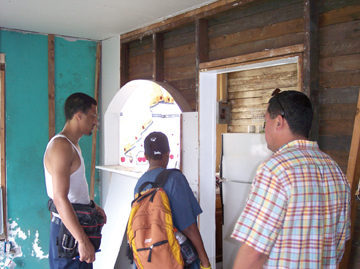North Gulfport, Miss. — An unforgiving sun beat down, making the work of rebuilding a partly leveled city all the more burdensome. But Marshall Leonard of York, Pa., was glad he came.
“I needed to come here and change things,” said the 26-year-old Youthbuild graduate, smoking a cigarette after helping to tear down the decaying frame of a house. Years after spending time in Youthbuild, he said, “I had got back into some bad things.” 
The one-year anniversary of Hurricane Katrina may be past, but one of the most ambitious relief efforts by a youth-serving organization is just getting up to speed.
Leonard is one of hundreds of Youthbuild participants and alumni whom YouthBuild USA has started placing in North Gulfport, Miss., a community along the Gulf of Mexico that was pummeled by Katrina. The organization hopes to combine its biggest commodity – young, trained construction workers – with the resources and clients of other programs to work on 300 sites (i.e., homes) by next summer.
The project, estimated to cost more than $3 million, will be financed with AmeriCorps grants, $75,000 from The Home Depot Foundation and whatever other funds YouthBuild USA can scrape up.
YouthBuild USA provides advocacy and various types of support for grantees of the federal Youthbuild program, which offers academic and job skills development to low-income youths. For this project, however, the Somerville, Mass.-based nonprofit is the service provider.
The group selected North Gulfport for two primary reasons: its high population of low-income, minority families (the same as most Youthbuild participants), and a sense among YouthBuild USA staff that New Orleans would dominate charitable giving to the region.
“People like Oprah [Winfrey] and Kobe [Bryant], they had already picked places they were going to help,” says David Slatery, who is overseeing the project for YouthBuild USA.
The 35 participants in the first wave, all alumni of Youthbuild programs, are older teens and young adults whose positions are funded with one-year AmeriCorps placements. Each gets a $100 weekly stipend, a $4,725 education award and the option of contributing to a savings account that YouthBuild USA will match at a 5-to-1 rate.
“This is one of our biggest graduate opportunities yet,” Slatery says.
All participants are given room and board at YouthBuild’s trailer village, based on the Naval Construction Battalion Center in Gulfport. The battalion center provided the land free of charge, with access to utilities; YouthBuild rents the trailers from a private company.
Like Leonard, many of the graduates said they needed another chance to escape their surroundings back home, in order to avoid a troubling path.
“Things had fell apart for me at home,” says Harold Ponder, a 23-year-old from New Jersey. “I got sucked back into a lot of negativity. I wasn’t at the level of work I should have been at. So I wanted to step out on my own, do something new.”
After a weeklong retraining and orientation in July, the 30 workers spread out to five sites, where the work included both repairs and demolitions. The first projects were partnerships with Habitat for Humanity and an interdenominational task force put together by the Rev. Eddie Hartwell, of Gulfport’s St. James Missionary Baptist Church. Those two groups provided the sites, lumber and other materials; YouthBuild brought labor and tools.
“These are guys I know can get jobs done fast,” says YouthBuild USA’s area construction manager, Tony Frazier, who moved his wife and two school-age children from Oregon to Gulfport for the year.
Frazier was glad to hear that his first crop of workers would be veteran Youthbuild grads. “At the Habitat sites, people were blown away by how fast they could get things done,” he says. In a little over the first month, the group had gotten to 26 sites, Frazier says.
The early going was not all rosy. One participant’s wallet was stolen from the trailer village in the first week, while another had an unresolved problem involving a court appearance back in California, and had to go back. Leonard, excited about helping himself and others, had to leave the program in late July for punitive reasons; YouthBuild USA would not say what they were.
Staying in a trailer village has been tough on the alumni, and life on a military base offers little recreation. “The work experience is great,” Ponder says. “When we’re back on base, it takes a lot of patience. I like to move around, travel, but I don’t have the opportunity to do it.”
But youth issues, resource shortages and other obstacles are par for the course on Youthbuild projects, Frazier says. “If you like things organized and disciplined, this isn’t the work for you,” he says.
Eventually, the Youthbuild veterans will be joined by groups of current members from around the country, who will travel to Gulfport to work for two to four weeks. YouthBuild will also use an AmeriCorps grant from the Mississippi Commission on Volunteer Service to fund 35 slots for Gulfport youth for three years. That will pick up some of the slack in youth employment and training in Gulfport, where the Job Corps Center is closed indefinitely after being destroyed by Katrina.
Organizers say they have enough workers. Slatery says YouthBuild USA’s ability to reach its goal of 300 sites will depend on how many partnerships it can arrange with groups that can provide supplies and homes to work on.
Contact: YouthBuildUSA (617) 623-9900, www.youthbuild.org.































